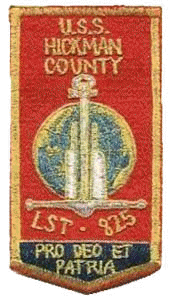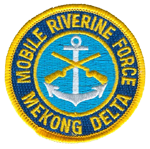LST-825 was launched 11 November 1944 by the Missouri Valley Bridge & Iron Co., Evansville, Ind., sponsored by Mrs. John Spindler; commissioned at New Orleans 8 December 1944, Lt. Henry V. Hartsell in command.
After shakedown in the Gulf of Mexico, LST-825 loaded oil and cargo at New Orleans and sailed for the West Coast. She arrived at San Diego 30 January 1945, discharged her cargo and continued on to Seattle, arriving 4 February. Loading oil, ammunition and embarking troops, LST 825 sailed for the Pacific 26 February 1945. The momentous Pacific campaign was in full swing at Okinawa when LST-825 reached that rocky Japanese fortress via Pearl Harbor, Guam, Eniwetok, and Ulithi on 21 April to discharge troop reinforcements and cargo.
LST-825 retired to Saipan, where she loaded cargo and supplies for the famed Seabees and returned to Okinawa 26 June. A late July convoy took the LST to Iwo Jima with cargo and supplies, and she returned to Okinawa 4 September. Hostilities having ended on 15 August, LST-825 embarked troops and equipment of the 5th Army Air Force destined to participate in the occupation of Japan. Entering Tokyo Bay 25 September, she disembarked the occupation forces and their equipment and set course for Okinawa.
During November 1945 LST-825 completed a second trip to Okinawa and Japan. On the 16th the landing ship embarked 514 enlisted men at Guam and sailed for the United States via Pearl Harbor as part of the “Magic Carpet” fleet bringing home veterans, arriving San Francisco 22 December. After a few months of tactical operations along the West Coast, LST-825 decommissioned at Swan Island, Portland, Oregon., and joined the Pacific Reserve Fleet 22 May 1946.
With the outbreak of hostilities in Korea, LST-825 recommissioned 3 November 1950, Lt Thomas R Ashton in command. After training out of San Diego, LST-825 entered Pearl Harbor 8 April 1951 where she transported passengers and cargo among the Hawaiian Islands until returning stateside 1 July. On 17 September she returned to Hawaii and operated there until her return 18 December to San Diego Departing San Diego 26 April 1952, the LST arrived at Yokosuka 11 June via Pearl Harbor and Midway. She made several cruises to the Korean coast to participate in tactical amphibious exercises and maneuvers of U.S. and Republic of South Korean troops. LST-825 also carried Communist prisoners of war from Korea to Japan, She returned to San Diego 5 March 1953, for scheduled amphibious landing exercises and fleet tactics along the western seaboard.
Her second Western Pacific cruise began on her departure from California 20 January 1954. Spring and early summer were spent in operations along the Japanese and Korean coasts as well as cargo duty between Eniwetok and Bikini. On 11 August 1954, LST-825 departed Yokosuka for French Indochina, where she assisted the humanitarian “Passage to Freedom.” When the French began to pull out of Indochina following their defeat by Communist rebels, over 800,000 North Vietnamese chose to forsake their homes and cast their lot with the southern half of their country rather than to live under communism.
Nearly 100 ships of the U.S. Navy under Rear Admiral Lorenzo S. Sabin helped transport the refugees in a mass exodus to freedom. In all, the U.S. Navy evacuated 310,848 North Vietnamese as well as 68,757 tons of cargo and over 8,000 vehicles. Hard-pressed and cramped sailors were rewarded when many of the 184 children born on the “Passage to Freedom” were named after U.S. ships and officers. Part of this humanitarian task force from 26 August to 5 October 1954, LST-825 made five trips from the Northern capital, Haiphong, to Southern ports with Vietnamese refugees and French troops and equipment. For an outstanding job done during this worthy cause, the ship was awarded the Vietnam Presidential Unit Citation.
LST-825 returned to San Diego 27 November 1954, and operated out of there until decommissioned 20 September 1955, having been renamed USS Hickman County on 1 July.
Hickman County recommissioned in service at San Diego 22 March 1963, Lt. Edward F. Powers in command. Assigned to LST Reserve Squadron 2, she reported to the U.S. Naval Amphibious Base at Little Creek, Va., 19 June 1963, to conduct amphibious warfare training. For the next 2 years she underwent various phases of training in amphibious warfare.
In May 1965, the Dominican Republic crisis erupted and Hickman County sailed from Norfolk 8 May laden with supplies for the logistical support of the U.S. Armed Forces keeping the peace in that country. Hickman County remained in the Caribbean area as a standby ship supplying the United States contingency at the Dominican Republic until 15 July when it called at Puerto de Haina, Dominican Republic, to embark Army troops and sailed for Sunny Point, N.C., debarking them 22 July 1965. From 26 August until 9 December, the busy ship transferred military personnel and cargo between the United States and the Dominican Republic and acted as host to foreign ships at San Juan, P.R. On 10 December she arrived at Little Creek, Va., departing for Brooklyn, N.Y., 4 days later for overhaul. On 23 February 1966 the ship transited the Panama Canal, arriving at Pearl Harbor 19 March and departed Kaneahe Bay, Oahu, 4 April 1966 for the Western Pacific, where she presently serves.
Awards earned during the Vietnam War: Combat Action Ribbon, (2) Meritorious Unit Commendation, RVN Gallantry Cross with Palm, RVN Civil Action Medal, First Class, with Palm, RVN Campaign Medal with 60’s device and the Vietnam Service Medal with (10) Battle Stars.


